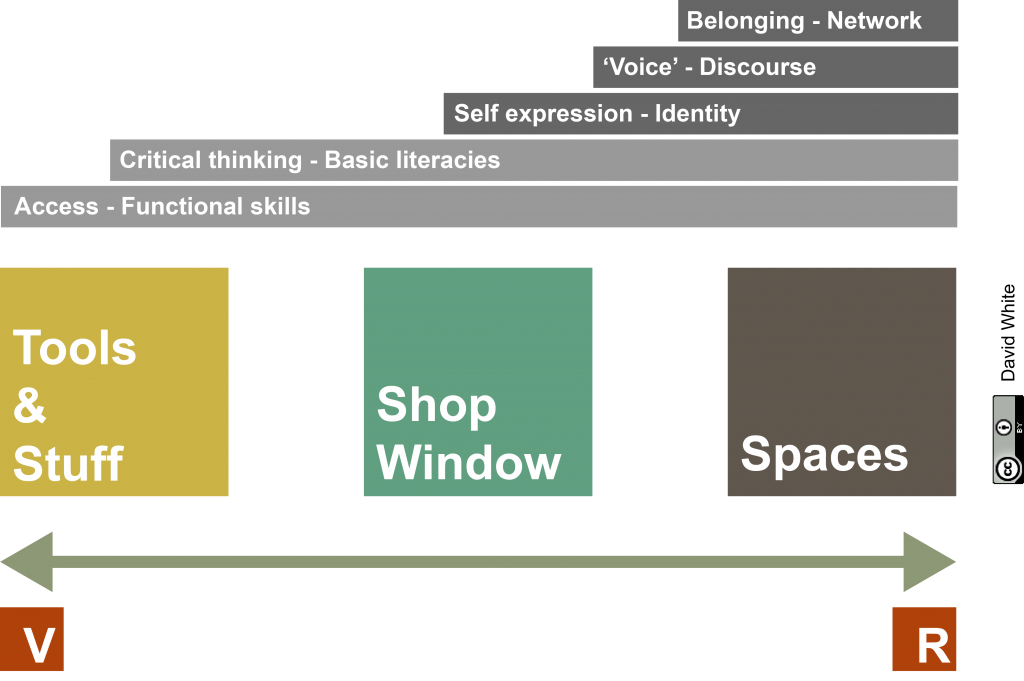For my ‘Spotlight stage’ session at Online Educa (15:35 on Thursday 4th) I’m exploring ‘Re-humanising eLearning’. This is a theme very much inspired by Catherine Cronin’s keynote at ALT-C this year in which she spoke, among other things, about the value of online identity and open practice.
When I’ve mentioned the theme of Re-humanising eLearning to colleagues many of them suggested that eLearning was never particularly ‘human’ in the first place. This is a reasonable, if disappointing, comment. Nevertheless, take a look at almost any Digital Literacy framework and it will have the distinctly human (in that it is about the ‘self’) concept of a Digital Identity highlighted in it somewhere. In my favourite framework/hierarchy from Helen Beetham and Rhona Sharpe Digital Identity is the apex of digital capability.
Yet the primary experience and conception of eLearning for most learners is based around receiving a bunch of content that has been placed into a curricular structure somewhere online. No need for an identity in this scenario, just anonymously grab what you need to get your work done.
In my session at Educa I’m going to highlight how the efficiency and flexibility of this impersonal form of eLearning risks holding students at arms length. This is especially the case those who have many calls on their time (work, childcare etc.) and can’t make it to face-to-face sessions or have chosen predominantly online forms of learning to fit around other activities. In this scenario it’s crucial that the digital becomes a humane learning space in which a sense of ‘togetherness’ can grow.
What interest me is how meeting in physical locations has an automatic feeling of togetherness built in, we feel we are sharing an experience without having to ‘know’ the other people in the room (a trip to the cinema is a good example of this). The very fact everyone has chosen to turn up to the event/session/lecture shows a common purpose. (I’m planning a little shared performance which involves the whole room in my Educa session to prove this point… See https://daveowhite.com/perfomance)
Online it’s a different story, when we move to predominantly text based environments we have to project our identity before we can interact or feel a sense of connection. What good would Twitter or Facebook be if we didn’t know who was talking/posting, if the screen way just a series of sentences with no attribution?
Identity and self expression are writ large in my mapping of ‘digital capabilities’ on to my 3 category model of digital engagement (see Breaking down digital).
I’m not sure I’ve captured everything I need to here but I’m confident that as soon as we move towards the Resident/Spaces end of the continuum we are engaging, however minimally, in forms of self-expression which leads to the projection of identity. It could be argued that it works along these lines:
Technology (and the people in it) fosters agency > forms of self-expression > formation of identity > increased agency > and so on…
(note: should make this into a looping diagram)
So in a digital context identity and self-expression are crucial to becoming and belonging, whereas in face-to-face scenarios some ‘togetherness’ can be felt without identity. Those who are fortunate enough to be able to regularity attend face-to-face sessions are likely to feel connected to their learning and their institution; to engender this online requires more explicit fostering of identity and expression.
At this point we could switch ‘digital’ for ‘higher education’ and the principle still fits. The digital in this case is simply a mirror for what I believe to be the overall point of higher education – to encourage and challenge students to nurture their identities as legitimate participants within their field of study. They arrive with a delicate sense of who they are in the world and leave with purpose and a solid sense of self…


Catherine Cronin December 4, 2014
A thought-provoking post, Dave — really wish I could have been at your session today! Many thanks for the mention (& I promise I’ll forgive you for misspelling my name 😉 )
I love your last sentence. It’s a beautiful description of the goal of higher education: encouraging, challenging, and supporting students in developing the many facets of their identities — social, scholarly, (pre-)professional, civic. I think part of this also is to provide opportunities for students to bring their interest-driven identities, practices, and networks into higher education — rather than assuming that students’ existing digital identities are nascent (or irrelevant). We’re very good at treating students as ‘tabula rasa’ when they enter HE (“here’s your new number/identity!”); not so good at recognising what students bring with them in terms of their existing identities, networks, and learning/networking practices — some of which they may wish to move beyond, but some of which they may want to develop and build upon. I’m thinking of Mimi Ito’s work here regarding second-level students — also relevant to HE.
Anyway, I look forward to continuing our conversations, with Donna, over the coming months and to our workshop in Galway in March 🙂
http://marvellous-mapping.eventbrite.ie/
David White December 5, 2014
I agree that incoming students will have existing, potentially fragile, practices and identities (I should have mentioned this). The challenge here is to find ways of conviening a conversation around this with a view to encouraging students to bring relevant roles and activities into educational contexts. Essentially gently validating practices which students might otherwise not see as legitimate. I like to thing the V&R mapping process is a good staring point for this process. See you in Galway 🙂